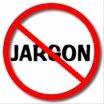Sun Mar 11, 2007

There is nothing more sickening than a piece of writing bloated and weighed down by heavy jargon and confusing language. Call it what you will - jargoneze, legalize, bureaucrateze, or just plain gobbledygook. If you’re spreading this kind of rot, you’re a language killer and should be tried and condemned by your peers as such. In his essay, _Politics and the English Language_, the great George Orwell calls us to vigilance:
A man may take to drink because he feels himself to be a failure, and then fail all the more completely because he drinks. It is rather the same thing that is happening to the English language. It becomes ugly and inaccurate because our thoughts are foolish, but the slovenliness of our language makes it easier for us to have foolish thoughts. The point is that the process is reversible. Modern English, especially written English, is full of bad habits which spread by imitation and which can be avoided if one is willing to take the necessary trouble.
Orwell was concerned with the use of English to deliberately mislead and confuse, but what about readability? How readable is your writing? Many handbooks and journals on technical writing stress readability as highly desirable and advocate the use of readability formulas. I’m referring to Flesch’s reading ease scale and Gunning’s Fog Index. These formulas calculate how many syllables are in your words and how short your sentences are and tell you if you’re a good writer or not.
Unfortunately it’s not that simple, and if you’ve ever played scrabble, you’ll know that there’s plenty of really obscure two letter words out there. So a low syllable count doesn’t always indicate readability. Neither do short sentences; sometimes short sentences break thought flow and are easier to understand when connected to other sentences through a logical connector.
The moral of the story is: Don’t use computerized readability formulas to evaluate a piece of writing. The only way to determine whether a piece of writing is good or not is to consider the audience. What is the writer’s purpose and who is the writing intended for? If you bear these two questions in mind, evil, manipulative writing can quickly be rooted out. The plain language movement advocates this approach:
Plain language is language that is understandable. What is clear, or what is plain to your intended audience, can only be decided by the audience.
So plain English is not simple baby two-syllable English. It is simply a version tailored to be as readable as possible for those who you’re writing for, whether they be ESL students or Javascript programmers, who might be quite comfortable with a few five syllable words in every paragraph.
Anyway, all this is a preamble for a new segment I’m going to unveil in the next post: The product riddle: What am I anyway? Stay tuned.